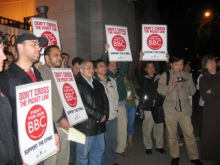World Service cuts condemned
Plans to axe 10 BBC foreign language services at BBC World Service have been criticised by BECTU.

Language service staff picket BBC Bush House on May 23.
The cutback, which could take effect as early as March next year, threatens 283 staff with redundancy, almost two-thirds of whom are employed at Bush House in London.
Most of the cuts fall among staff working on foreign language services, either at Bush House or abroad, but 47 of the planned redundancies will be in BBC News, which runs the English-language newsroom feeding the World Service.
According to the BBC, which announced the cuts today, October 25, cash saved by closing a quarter of World Service language channels will be used to fund a new Arabic TV channel.
BECTU condemned the announcement as "a devastating blow to the BBC's ability to speak to all nations in all tongues", and predicted that the specialist nature of the work done by many of the staff affected could reduce their chances of being redeployed elsewhere in the World Service, or the BBC itself.
"While we would normally welcome the BBC's expansion into Arabic TV without hesitation, we cannot ignore the potential threat of hundreds of compulsory redundancies", said a union spokes person.
Concerns have also been raised about the interpretation that overseas observers could put on the changes at BBC World Service.
"It is clear that the transfer of cash from European language services into Arabic TV is driven by political objectives, and the decision will create a perception abroad that the BBC World Service is working to a government agenda", said BECTU.
"Our union and the National Union of Journalists will stand by our members in the World Service, and fully support their determination to remain honest, objective, and editorially independent from the government", said the BECTU spokesperson.
BBC World Service is funded by a grant from the UK government, currently £239 million per year, but throughout its history has fiercely defended its independence.
Unions now plan to open talks with World Service management, in an effort to avoid compulsory redundancies where possible. A political campaign is also being planned, to persuade decision-makers that the creation of an Arabic TV channel should not be funded by slashing back other services.
Earlier this year, union members at the BBC, including the World Service, took strike action on May 23 against plans for nearly 4,000 job cuts at the Corporation.
Negotiators won an agreement that no staff would be dismissed, unless they had volunteered, until July 2006, and efforts would be made meanwhile to limit the number of compulsory redundancies.
Unions will now press the World Service to honour the peace agreement, and give staff threatened with redundancy the same 12-month guarantee as the rest of the BBC that there would be no enforced dismissals.
Of the 236 World Service staff affected by today's proposals, 139 are employed in the UK delivering the 10 language channels facing closure, and the remainder work on foreign services abroad.
Services threatened with the axe are: Bulgarian, Czech, Croat,Greek, Hungarian, Khazak, Polish, Slovak, Slovene, and Thai. Additionally there are plans to rationalise the BBC's Portuguese and Brazilian services. which accounts for 14 of the post cuts.
The BBC's portfolio of foreign language services will reduce from 42 to 32 if the cuts go ahead.
BECTU and NUJ plan to hold a meeting for union members in Bush House at 1300 on Wednesday October 26. Check locally for details
Amended 25 October 2005
Amended (2) 25 October 2005
Amended 26 October 2005
